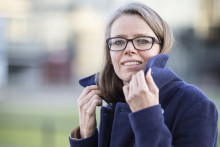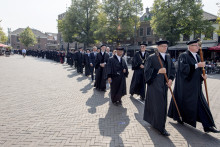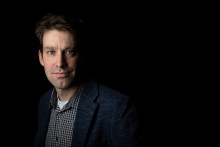ERC CONSOLIDATOR GRANT
ERC (European Research Council) Consolidator Grants are annually awarded to excellent scientists who want to consolidate their own independent research team or programme. In 2018, the success rate of receiving this grant was 12,2%.
‘2019 is my lucky year,’ says the professor. ‘I was awarded two big grants: one from the Dutch Research Agenda (NWA) and now the ERC Consolidator Grant. While the NWA project has many partners, the ERC is only for me. I’m super happy that I can further strengthen my own research line. It gives me the opportunity to focus on fundamental problems in risk analysis that I want to explore. As, it was the third time I applied for the ERC, this is a result of pure determination.’
'2019 is my lucky year'
Safety and security
As Stoelinga explains, the main objective of the funded project is to ‘marry two historically separate fields’ – safety and security. While safety refers to prevention of accidental failures, (cyber)security is a protection against malicious attacks. ‘The two fields are historically very separate, yet they are so intertwined. Measures that increase safety often decrease security and vice versa. For example, if you lock your door at night, it’s great for security against burglars, but it is bad for safety in case of fire.’
The goal of the CAESAR project is to develop an effective framework for the joint analysis of safety and security risks. ‘I want to make safety and security decisions more accountable and more systematic, so that you don’t overlook any risks,’ says Stoelinga. ‘The decision making should become more transparent and quantitative. Decisions should be made based on data, not feelings because research has shown that people don’t have good intuition when it comes to risks. People text while driving, but are afraid to board an airplane.’
marielle stoelinga
Marielle Stoelinga is a professor of Risk Management for High-tech systems at the Formal Methods and Tools group at the UT faculty of Electrical Engineering, Mathematics and Computer Science. Since 2017, she is also a professor of Software Science at the Radboud University in Nijmegen. Her ERC funded project CAESAR will be hosted by the UT. It will begin in early 2020 and run for five years.
Tradeoffs
The framework Stoelinga aims to develop could be applied for instance for monitoring production lines, Internet of Things, as well as emerging technologies such as drones or self-driving cars. ‘Sensors in autonomous cars use information from the environment to determine distance from the car in front, for instance. That is nice and safe, but not secure because hackers can get in and take control of your car. Yet, if you close the system off, you protect it against hackers but make it unsafe. My research will not solve these conflicts, but it will provide means for experts to make the best possible tradeoffs. At the heart of this framework lie deep mathematic theory and algorithms that handle probability and uncertainty.’







